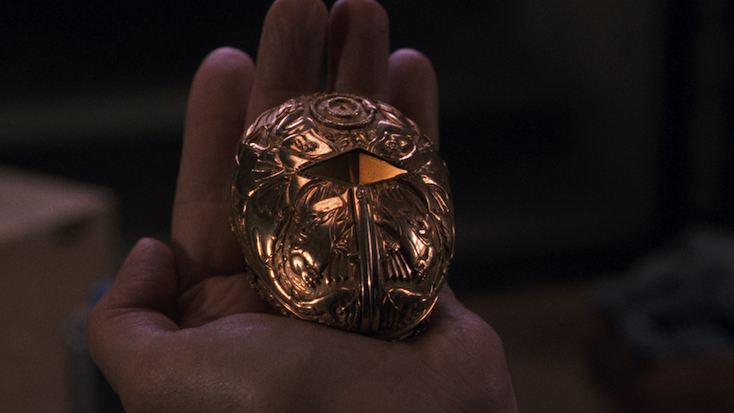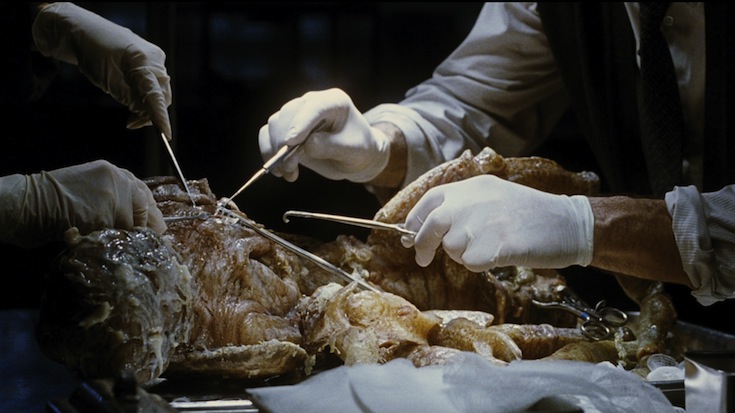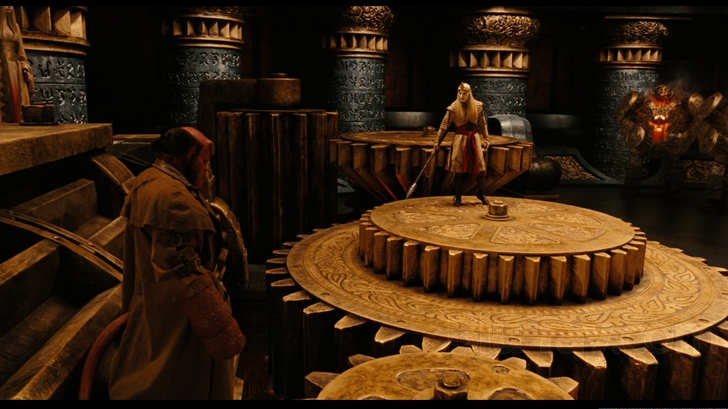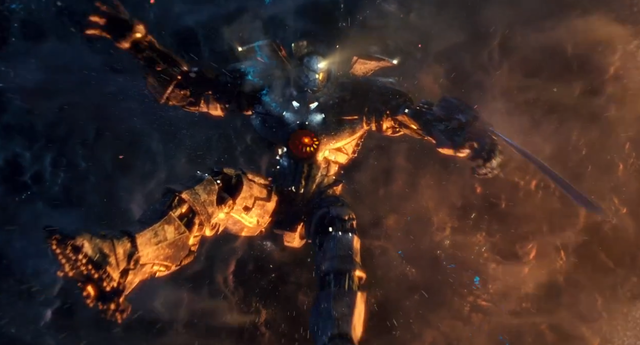So, Guillermo del Toro...Just who is he? What has he done? Why is everyone so excited about the new film called Pacific Rim? Is that excitement about how cool it looks? Or does it have more to do with who is behind this cool looking film? Not that you are, but if you happen to be asking these questions, you might be one who has seen a del Toro film and not even realized it. He isn't the most prolific filmmaker out there. With only 7 (soon to be 8) feature films to his resume, this is a sign of an artist who takes his time and great care in crafting a quality, worthwhile experience. In order to figure out who this guy is, we must trace his path through his filmography.

In the humble beginnings of his career, Del Toro had been working in the film industry for many years as a makeup and effects artist, an experience that has informed his work as a filmmaker, which he had been doing since the mid 80's. However, it was his feature film directorial debut that would put him on the radar. Enter: Cronos (1993). Written and directed by del Toro, it contains the trademarks that make a film a del Toro film. The tonally and thematically dark aspects, elements of the fantastic or supernatural, and the fascination with all things monster-ish are there. While the premise of this film, which has to do with a mysterious device created by an old alchemist, which grants eternal life, but at a cost too great to pay may seem trite, del Toro's execution is what sets this film apart from other films of a similar genre.

We come to the next film, Mimic (1997). This science fiction horror film is del Toro's first American picture. The story centers on an entomologist who, along with her husband, create a new species of cockroach in order to combat a new plague carried by the roach population in New York city. Now, it is widely known that del Toro's original vision for this film is not what ended up being released, due to studio head involvement, which resulted in his displeasure and near disavowal of this film. Be that as it may, there are still traces of de Toro's hand to be found. See checklist: clockwork, dark spaces, insect-like creatures, monsters, and creatures that aren't yet fully formed. I think you'll find that most, if not all of these elements are in place.

Thoroughly unsatisfied with his experiences on the Mimic film, del Toro headed to Spain and went back to the basics. Based on the overwhelmingly positive response to his third feature The Devil's Backbone (or El Espinazo del Diablo) (2001), it seems like back to the basics wasn't a bad deal at all. The independently produced system allowed him full creative control of the story he wanted to tell, which ended up being very thoughtful and focused. Speaking of story, it is set at the end of the Spanish Civil War. It centers on a boy named Carlos who is taken in by a man and woman who run a small home for orphans in Spain. The boy soon begins to have visions of apparitions he can't really describe and this is where things get interesting as peculiar stories are told about another child who mysteriously went missing. This is del Toro in fine form, but he is far from being done at this point.

The year following Backbone, would see del Toro taking on the comic book blockbuster film, Blade 2 (2002). A fan of comic books, it's probably safe to say that del Toro was super excited to step into the director's chair for this film. Following the gritty first installment, this one is more bloody and continues the exploits of Marvel Comics' most hardcore vampire hunter, Blade, the half-human/half-vampire sworn to hunt down all vampires. This time around though, he must team up with his sworn enemies in order to stop a more sinister threat. It should be noted that while this is a well-known comic book property, again del Toro puts his stamp on it particularly with the makeup effects and the looks of various creatures. Coming from a makeup effects background, there is something to be said for the visual look of the film (or any film he's done). I mean, he speaks the makeup language as well as the filmmakers language. This is a fun flick and seemed to be a much better Hollywood experience for del Toro than his last time out with Mimic, in spite of the mixed critical response. Del Toro would have an even better time in Hollywood with his next film.

Two years later, he would return to Hollywood with another blockbuster based on a comic book property, Hellboy (2004). For many, this film ranks at the top, or near the top of the favorite del Toro films list. Based on the comic book of the same name, it's about a demonic beast who despite looking like a quite reprehensible villain, is actually the good guy, believe it or not. He secretly works for the government to protect the earth from supernatural threats. Right up del Toro's alley. Here is a dark character in Hellboy who has a sense of humor and loves what he does, which can be attributed to Ron Perlman's portrayal of the character, he's really good in this film. You've got the supernatural elements, you've also got the various creatures and great make up, which the film won a Saturn Award for. Del Toro is having more fun with this one. However, he isn't having so much fun that he has forgotten where he started from as he would return to his roots again for one of his most artful, most lyrical and most successful contributions to his oeuvre.

We come now to Pan's Labyrinth (or El laberinto del fauno) (2006). This is del Toro at the height of his powers. Though to be fair, you could argue that even with his first film, he was at the height of his powers because he already understood how to tell a very strong and visually compelling story. Cronos was a huge success right out of the gate winning numerous awards, so del Toro was no stranger to success at this point. Pan's Labyrinth was nominated for six Academy Awards and won three, one of which was for Best Makeup. (There is the makeup expertise being rightfully recognized again.) Perhaps the more accurate thing to say about del Toro by the time he reaches this film, is not that he is at the height of his powers, but that he is expanding the height of his powers as a storyteller. He isn't going higher, he is branching outward. This emotionally compelling dark fantasy set five years after the Spanish Civil War is the story of the journey of a young girl discovering her true identity with the help of a mysterious faun. This is another del Toro masterpiece.

After the huge success of Pan's Labyrinth, del Toro now had enough pull to begin production on a sequel to Hellboy. He hit us with Hellboy 2: The Golden Army (2008). This time, Hellboy and the Bureau for Paranormal Research and Defense must go up against a rogue elf whose plan is to awaken an ancient army of golden robots and take over the world. With more of what made the first film so good, del Toro has firmly assured us that his skills haven't fallen off following a massive success.

The upcoming Pacific Rim looks to continue del Toro's impressive streak. But why would he make a film like this, a film that seems so unlike anything he's ever done? Well, when you think of how monsters are one of the things that fascinate him, and seeing as how this is a kind of ultimate monster movie, how could he not make this film? It totally fits in with del Toro's sensibilities, this is just him exploring the things that have always fascinated him. This film however, will obviously be less artsy than say Backbone or Pan's Labyrinth, and more in the vein of the Hellboy films in terms of the blockbuster and fun factor. This isn't to say that there won't be an element of its own lyricism and beauty because rest assured, it looks like a beautiful film. It also feels like it will be his most unabashed and unrestrained film. We will see what all the fuss is about this week and if del Toro's previous films suggest nothing else, we should be in for a good time with Pacific Rim.